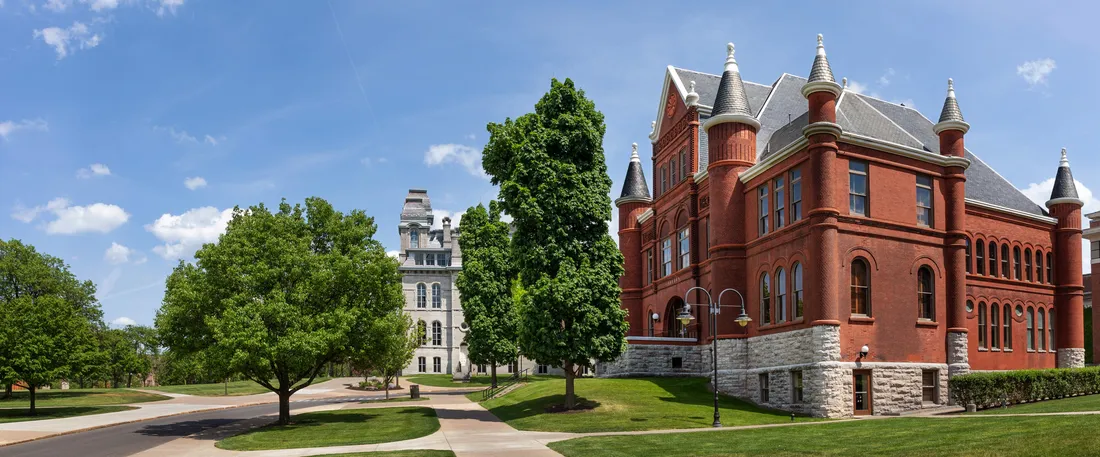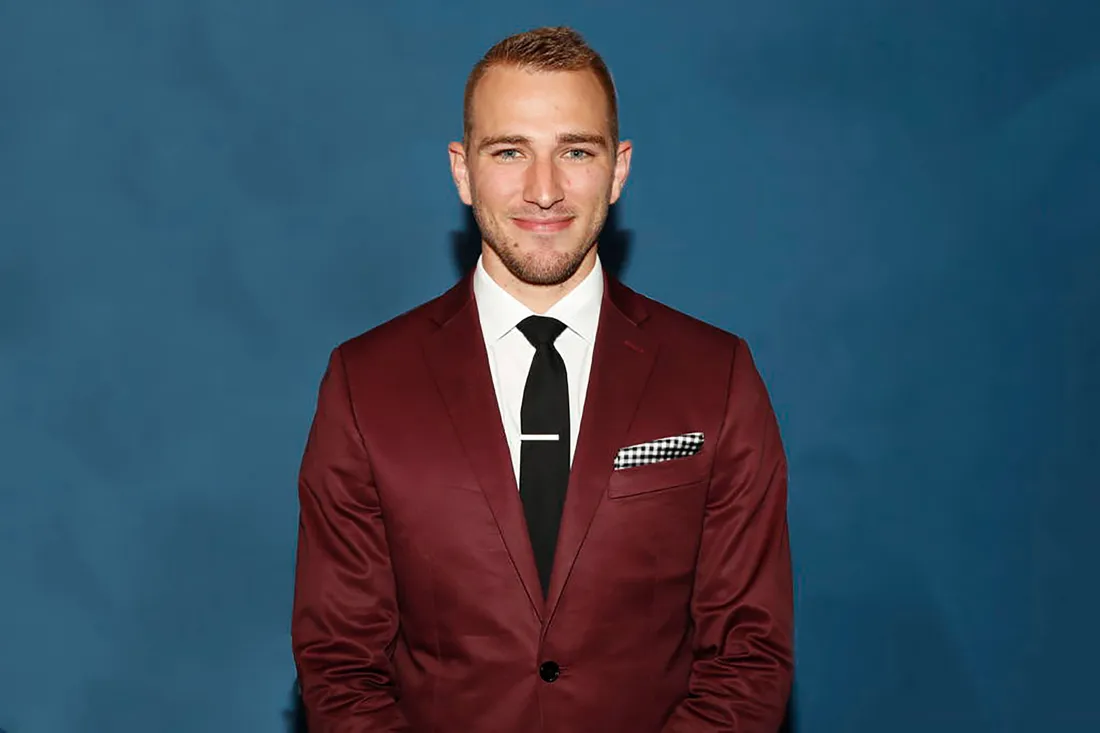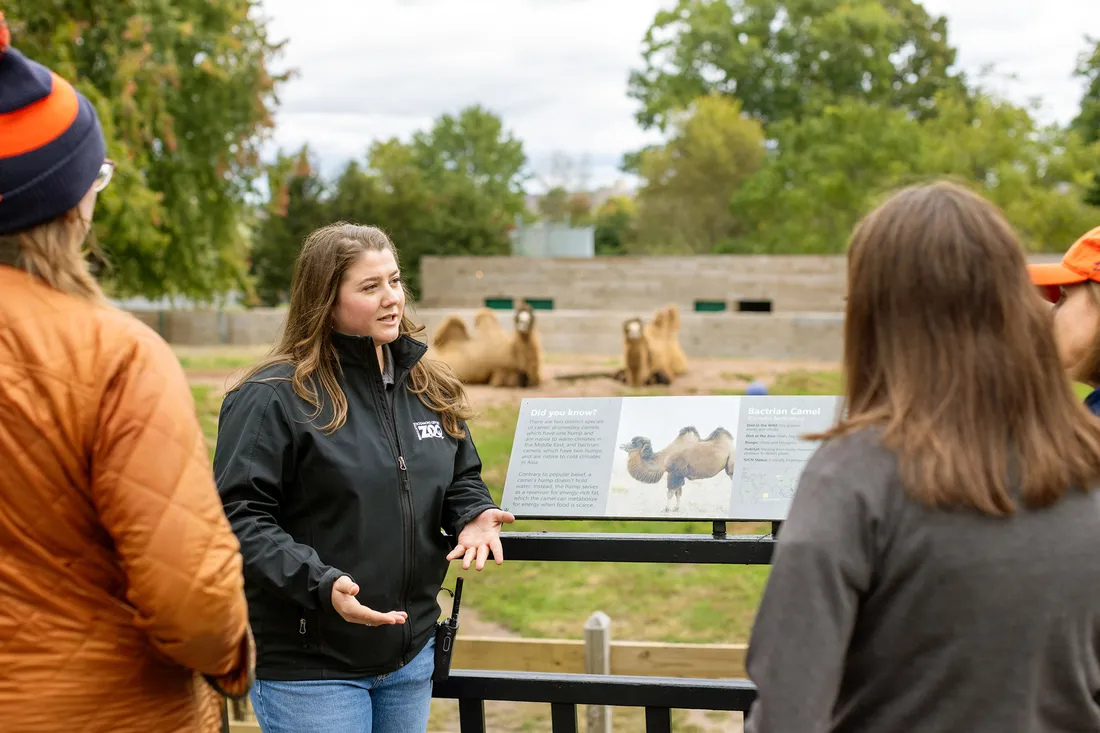
Mary Hillebrand G’23, seen here speaking to visitors at the Bactrian camel exhibit, found her dream career after attending Syracuse University’s School of Education.
As an undergraduate student, Mary Hillebrand G’23 ran into a problem that threatened to derail her career plans. But thanks to the M.S. in Science Education (Grades 7-12) program at Syracuse University’s School of Education, she transformed it into a life-changing opportunity.
Hillebrand’s issue arose while she pursued her undergraduate degree in Environmental Education and Interpretation at the State University of New York College of Environmental Science and Forestry. She loved the science, especially the environmental biology and conservation aspects. But Hillebrand discovered that a scientific career with lots of research wasn’t for her.
“My initial response was to panic,” Hillebrand says. “‘What do I do now? What place do I have in science if I don’t do research?’”
Finding a Solution at Syracuse
One of her professors suggested that Hillebrand explore the science education master’s degree program at Syracuse University, SUNY’s neighbor. “She spoke so highly of the faculty,” Hillebrand says. “That made me feel more comfortable jumping in, especially from a tiny university to a much bigger university.”
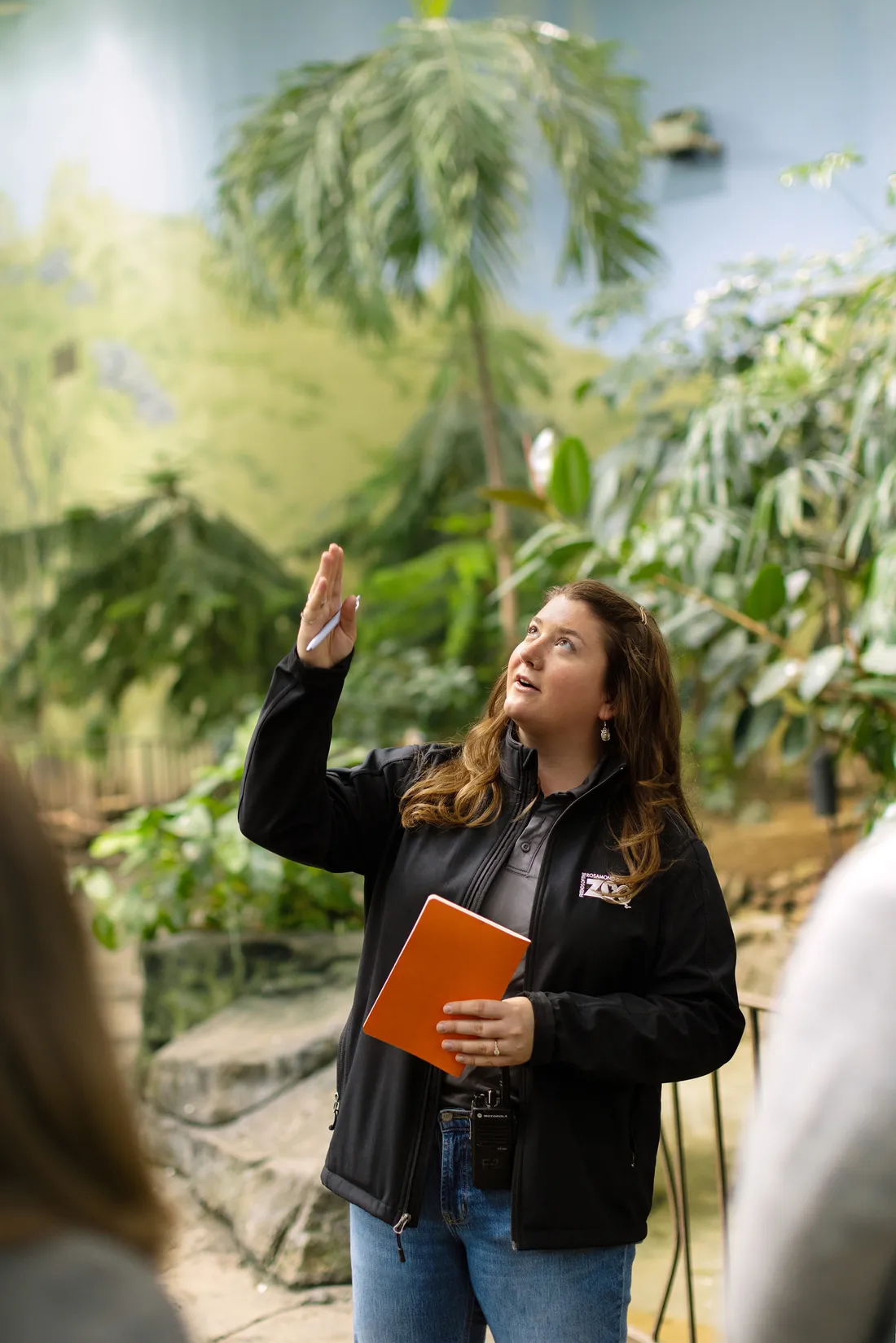
Hillebrand’s time at the University revealed that science extends beyond research—it’s also about inspiring others and fostering a connection with the natural world. Now, she brings that enthusiasm to her role at the Rosamond Gifford Zoo.
Hillebrand liked what she saw at Syracuse – especially the School of Education’s focus on diversity and inclusion and educating all students. “Also, every staff member and student were really passionate and kind and inviting, like they wanted you to come be a part of what they were doing,” Hillebrand says. “That was such a draw.” Other attractive features included the program’s short 13-month duration, New York State teacher certification for graduates, and extensive field placements.
Hillebrand admits that standing in front of a class for the first time at a placement was a bit nerve-racking. “There’s so many things going through your head at the same time, and you’ve got all these faces looking at you,” she says. “So it was intimidating. But at the same time it was really exciting. And after a couple of minutes I thought, “‘Yeah, I really enjoy doing this.’”
While on her lunch break as a student teacher one day, Hillebrand saw a job opening for an education coordinator at the Rosamond Gifford Zoo in Syracuse. “I was like, ‘Wow! Education, animals, people, science – these are all my favorite things. I have got to take a stab at this.’”
(At Syracuse University) You meet people who you can continually reach out to. It really does build you a foundation that does not go away when you graduate.
Mary Hillebrand G'23
She got the job, and six months later the zoo promoted her to her current position of senior education coordinator. She develops curriculum and programs with her team and spends much of her time teaching the teachers – whether they’re adult docents or high school students who help educate zoo visitors during the summer.
The goal with all her work is to connect guests with the zoo at a deeper level through interpretative education about the zoo’s role in conservation. “I love working at the zoo,” Hillebrand says. “It’s a really wonderful job. And I work with really wonderful people.”
A Gift to Share Knowledge
Hillebrand says she “absolutely” uses what she learned at Syracuse in her job – skills in everything from developing curriculums to educating all kinds of people. “Syracuse is a very diverse city,” Hillebrand says. “Having knowledge about how to reach everyone is invaluable to this position.”
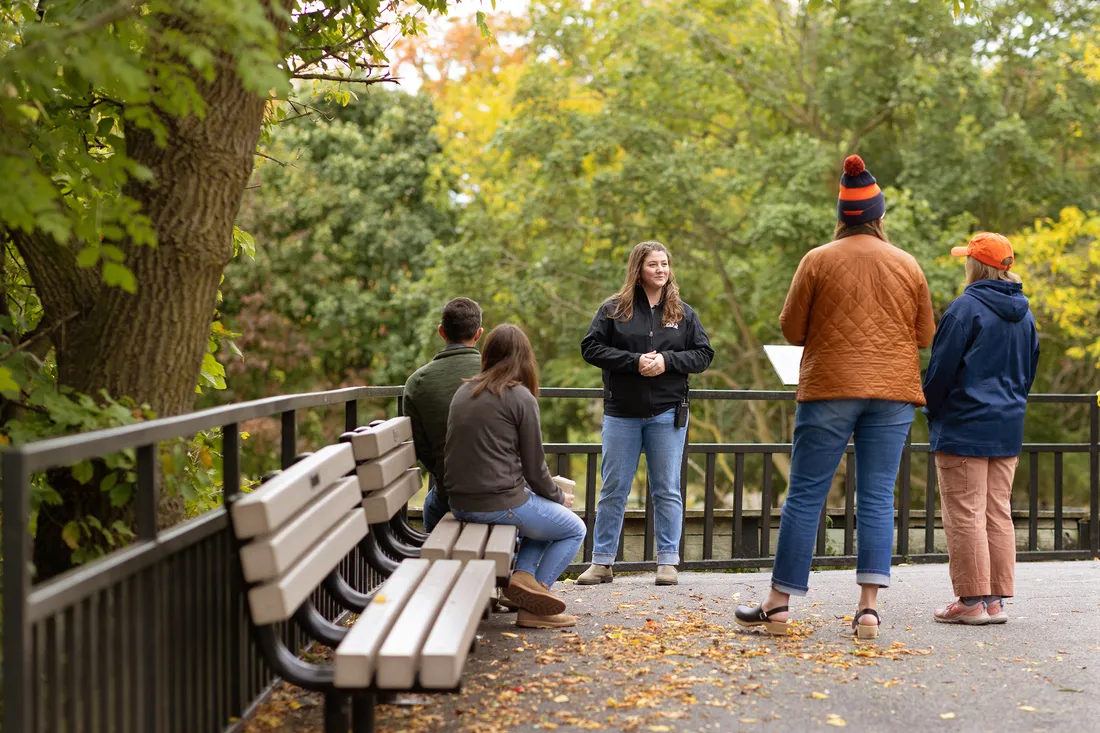
Hillebrand engages with visitors at the zoo daily using the practical skills she gained while at the University. Whether leading a small group or coordinating larger educational programs, her training enables her to inspire a deeper understanding of wildlife and conservation.
As it turned out, Hillebrand’s master’s degree studies perfectly complemented her undergraduate work. They also gave her a broader understanding of science education and how to succeed as a science educator. “My undergraduate degree was very focused in environmental biology and interpretative environmental education,” she says. “My master’s allowed me to learn more about formal education and what current science education looks like in schools. That helps me better understand where people are coming from.”
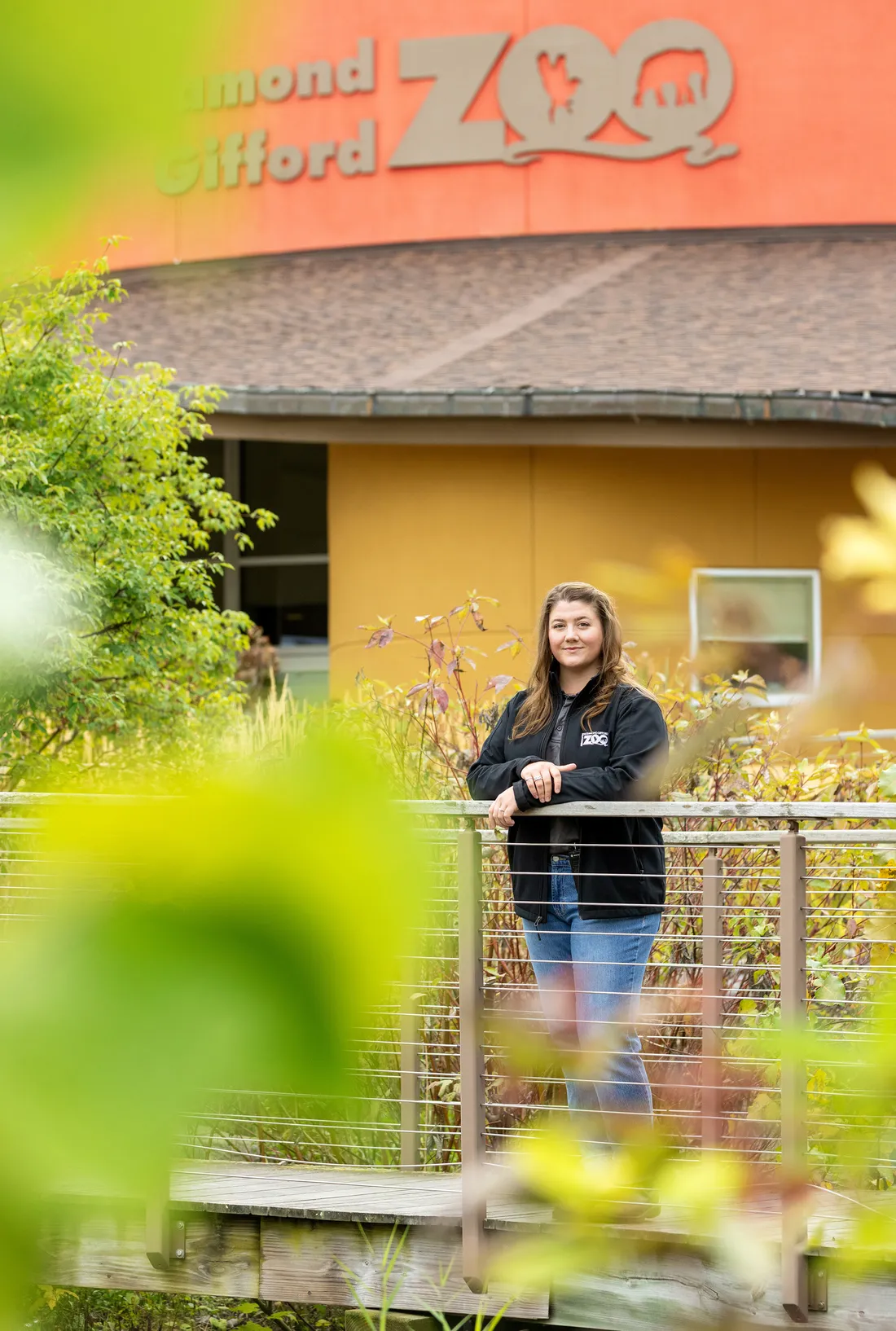
The connections Hillebrand built and the experiences she gained continue to guide her throughout life, empowering her to make an impact as an educator at the zoo.
Was getting her master’s degree worthwhile? “The financial aspect and the time commitment can feel really daunting,” Hillebrand says. “But it taught me so many things that I use every single day in my job, so I absolutely think it was worth it.”
Her master’s degree program at Syracuse was especially worthwhile, Hillebrand says, because it helped her discover her true calling as a science educator.
“No matter if you’re at a nature center or a zoo or in a school, we have the chance to take all we can learn from Syracuse and bring that to the next generation of learners,” Hillebrand says. “And it’s a gift to be able to share that knowledge and to show students that they have a place in science, and they can be a science learner, and they are a science learner.
“Syracuse University has some really amazing people in their School of Education and the School of Education’s science program,” she adds. “You meet people who you can continually reach out to. It really does build you a foundation that does not go away when you graduate.”

